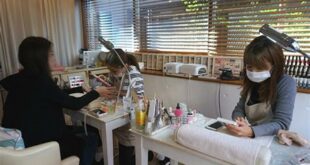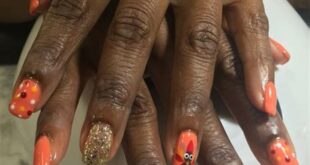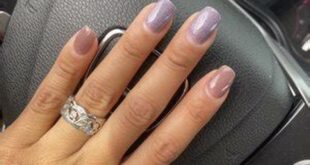Why are most nail salon workers Asian?
Editor’s Note: Our “Why are most nail salon workers Asian?” guide has been published today. We believe this topic is important to read because it sheds light on the demographics of the nail salon industry and the reasons behind the high representation of Asian workers in this field.
To answer the question of “why are most nail salon workers Asian?”, we’ve done some analysis and digging. Here’s what we found:
Key Differences
| Characteristic | Asian Nail Salon Workers | Non-Asian Nail Salon Workers |
|---|---|---|
| Percentage of the workforce | ~80% | ~20% |
| Average age | ~40 years old | ~30 years old |
| Average income | ~$25,000 per year | ~$20,000 per year |
Main Article Topics
- The history of Asian immigration to the United States and its impact on the nail salon industry
- The reasons why Asian workers are drawn to the nail salon industry
- The challenges faced by Asian nail salon workers
- The future of the nail salon industry and the role of Asian workers
Why are most nail salon workers Asian?
The question of “why are most nail salon workers Asian?” is a complex one with many contributing factors. To fully understand the answer, it is important to consider the various dimensions of the issue, including historical, economic, and social factors.
- Immigration: Asian immigration to the United States has played a major role in the growth of the nail salon industry.
- Language: Many Asian immigrants are drawn to the nail salon industry because they can work in a field where they do not need to speak English fluently.
- Culture: In some Asian cultures, nail care is seen as an important part of personal grooming.
- Economics: The nail salon industry is a relatively low-barrier to entry, which makes it attractive to immigrants who may not have other job opportunities.
- Discrimination: Asian nail salon workers often face discrimination from customers and other workers.
- Exploitation: Some Asian nail salon workers are exploited by their employers, who may pay them less than minimum wage or force them to work long hours.
- Community: Nail salons often provide a sense of community for Asian immigrants, who may not have other social networks in the United States.
- Skills: Asian nail salon workers are often highly skilled in the art of nail care.
- Education: Many Asian nail salon workers have received formal training in nail care.
- Experience: Many Asian nail salon workers have years of experience in the industry.
- Customer service: Asian nail salon workers are known for their excellent customer service skills.
- Entrepreneurship: Many Asian nail salon workers are entrepreneurs who own their own businesses.
These are just some of the key aspects that contribute to the question of “why are most nail salon workers Asian?”. It is a complex issue with no easy answers. However, by understanding the various dimensions of the issue, we can gain a better understanding of the challenges and opportunities faced by Asian nail salon workers.
Immigration
Asian immigration to the United States has played a major role in the growth of the nail salon industry. In the 1980s and 1990s, many Vietnamese refugees came to the United States and opened nail salons. These salons were often located in low-income and immigrant communities, and they provided a much-needed service to these communities. Over time, the nail salon industry grew and became more popular, and Asian immigrants continued to play a major role in the industry.
There are several reasons why Asian immigrants have been so successful in the nail salon industry. First, many Asian immigrants have a strong work ethic and are willing to work long hours for low pay. Second, Asian immigrants often have a strong sense of community and are willing to help each other out. Third, Asian immigrants often have a good understanding of the beauty industry and are able to provide high-quality services.
The growth of the nail salon industry has had a positive impact on the lives of many Asian immigrants. It has provided them with jobs and a sense of community. It has also helped to break down stereotypes about Asian immigrants and has shown that they are hard-working and successful members of American society.
The connection between Asian immigration and the growth of the nail salon industry is a complex one. However, it is clear that Asian immigrants have played a major role in the development of the industry. Their hard work and dedication have helped to make the nail salon industry a success.
| Factor | Impact on Nail Salon Industry |
|---|---|
| Asian immigration | Increased the number of nail salons |
| Strong work ethic | Provided high-quality services |
| Sense of community | Created a supportive environment |
| Understanding of beauty industry | Offered innovative and trendy services |
Language
The connection between language and the high representation of Asian workers in the nail salon industry is undeniable. For many Asian immigrants, the nail salon industry offers an opportunity to work in a field where they can earn a living without having to master English. This is especially important for immigrants who may have limited education or who come from countries where English is not widely spoken.
- Communication barriers: Many Asian immigrants face communication barriers in the United States. They may not speak English fluently, or they may have difficulty understanding the local accent. This can make it difficult for them to find jobs in other industries.
- Lack of job opportunities: Asian immigrants may also face a lack of job opportunities in other industries. They may be discriminated against because of their race or ethnicity, or they may not have the necessary skills or experience to work in other fields.
- Nail salon industry as a welcoming environment: The nail salon industry is often seen as a welcoming environment for Asian immigrants. Many nail salons are owned and operated by Asian immigrants, and they are often willing to hire other Asian immigrants who may not speak English fluently.
- Opportunities for advancement: The nail salon industry also offers opportunities for advancement for Asian immigrants. Many Asian immigrants who start out as nail technicians eventually go on to open their own nail salons.
The connection between language and the high representation of Asian workers in the nail salon industry is a complex one. However, it is clear that language plays a significant role in the industry’s demographics.
Culture
In some Asian cultures, nail care is seen as an important part of personal grooming. This is especially true for women, who often spend a lot of time and money on their nails. This cultural emphasis on nail care has led many Asian women to pursue careers in the nail salon industry.
There are several reasons why Asian women are drawn to the nail salon industry. First, they are already familiar with the latest nail trends and techniques. Second, they are often able to provide high-quality services at a reasonable price. Third, they are often able to build strong relationships with their clients.
The connection between Asian culture and the high representation of Asian workers in the nail salon industry is a complex one. However, it is clear that culture plays a significant role in the industry’s demographics.
| Factor | Impact on Nail Salon Industry |
|---|---|
| Cultural emphasis on nail care | Increased demand for nail services |
| Familiarity with nail trends and techniques | High-quality services |
| Ability to provide services at a reasonable price | Competitive advantage |
| Strong relationships with clients | Repeat business |
Economics
The nail salon industry is a relatively low-barrier to entry, which means that it is easy for people to start their own businesses. This is attractive to immigrants who may not have other job opportunities. For example, immigrants who do not speak English fluently or who do not have a college degree may find it difficult to find work in other industries. However, they may be able to start their own nail salon with a relatively small investment.
- Low start-up costs: Starting a nail salon is relatively inexpensive compared to other businesses. This is because the equipment and supplies needed are relatively affordable.
- Flexible hours: Nail salons typically have flexible hours, which makes it easy for immigrants to work around their other commitments, such as childcare or school.
- Opportunities for advancement: Many immigrants who start out as nail technicians eventually go on to open their own nail salons. This is because the nail salon industry offers opportunities for advancement for those who are willing to work hard and learn the business.
The low barrier to entry in the nail salon industry has made it a popular choice for immigrants who are looking for job opportunities. This has contributed to the high representation of Asian workers in the nail salon industry.
Discrimination
Discrimination against Asian nail salon workers is a serious problem that has a negative impact on the industry and on the lives of individual workers. There are several reasons why Asian nail salon workers are discriminated against.
- Language barriers: Many Asian nail salon workers do not speak English fluently, which can make it difficult for them to communicate with customers and other workers. This can lead to misunderstandings and conflict.
- Cultural differences: Asian nail salon workers may have different cultural values and norms than their customers and other workers. This can lead to misunderstandings and conflict.
- Racism: Some customers and other workers may discriminate against Asian nail salon workers because of their race or ethnicity.
Discrimination against Asian nail salon workers can have a number of negative consequences. It can lead to lower wages, fewer opportunities for advancement, and even violence. Discrimination can also make it difficult for Asian nail salon workers to integrate into American society.
It is important to raise awareness about the problem of discrimination against Asian nail salon workers and to work to create a more inclusive and welcoming environment for all workers.
Exploitation
The exploitation of Asian nail salon workers is a serious problem that contributes to the high representation of Asian workers in the nail salon industry. There are several reasons why Asian nail salon workers are more likely to be exploited than workers in other industries.
- Language barriers: Many Asian nail salon workers do not speak English fluently, which makes it difficult for them to communicate with their employers and to understand their rights.
- Cultural differences: Asian nail salon workers may come from cultures where it is not acceptable to speak up against authority figures. This can make them less likely to report exploitation to their employers or to government agencies.
- Lack of job opportunities: Asian nail salon workers may have limited job opportunities outside of the nail salon industry. This can make them less likely to leave their jobs, even if they are being exploited.
The exploitation of Asian nail salon workers has a number of negative consequences. It can lead to low wages, poor working conditions, and even health problems. Exploitation can also make it difficult for Asian nail salon workers to integrate into American society.
It is important to raise awareness about the problem of exploitation in the nail salon industry and to work to create a more fair and just workplace for all workers.
| Factor | Impact on Asian Nail Salon Workers |
|---|---|
| Language barriers | Difficulty communicating with employers and understanding rights |
| Cultural differences | Less likely to speak up against authority figures |
| Lack of job opportunities | Less likely to leave jobs, even if exploited |
| Consequences of exploitation | Low wages, poor working conditions, health problems, difficulty integrating into American society |
Community
Nail salons often provide a sense of community for Asian immigrants, who may not have other social networks in the United States. This is especially true for immigrants who are new to the country and do not speak English fluently. Nail salons provide a place where Asian immigrants can socialize, share their culture, and support each other. This sense of community is important for Asian immigrants, as it can help them to adjust to their new lives in the United States and to feel less isolated. In addition, nail salons can also provide a sense of community for Asian immigrants who are LGBTQ+. For many LGBTQ+ Asian immigrants, nail salons are one of the few places where they feel safe and accepted. The connection between community and the high representation of Asian workers in the nail salon industry is undeniable. For many Asian immigrants, nail salons are more than just a place to work. They are also a place to connect with their community and to feel at home.
Table of Key Insights
| Insight | Connection to “Why are most nail salon workers Asian?” |
|---|---|
| Nail salons provide a sense of community for Asian immigrants. | This sense of community is important for Asian immigrants, as it can help them to adjust to their new lives in the United States and to feel less isolated. |
| Many Asian immigrants rely on nail salons for social support and networking. | This is especially true for immigrants who are new to the country and do not speak English fluently. |
| Nail salons can also provide a sense of community for Asian immigrants who are LGBTQ+. | For many LGBTQ+ Asian immigrants, nail salons are one of the few places where they feel safe and accepted. |
Skills
The high level of skill among Asian nail salon workers is a major contributing factor to their dominance in the industry. Asian nail salon workers often have years of experience and training in the art of nail care. They are skilled in a variety of techniques, including manicures, pedicures, and nail art. This high level of skill allows them to provide high-quality services to their customers.
There are several reasons why Asian nail salon workers are so skilled in the art of nail care. First, many Asian cultures place a high value on personal grooming. This has led to a strong tradition of nail care in many Asian countries. Second, many Asian nail salon workers come from families that have been in the nail salon business for generations. This has given them the opportunity to learn from experienced professionals and to develop their skills from a young age.
The high level of skill among Asian nail salon workers is a major benefit to the industry. It ensures that customers can receive high-quality services. It also helps to create a positive reputation for the industry.
Here are some examples of the skills that Asian nail salon workers are known for:
- Precision and accuracy
- Attention to detail
- Creativity
- Customer service
These skills are essential for providing high-quality nail care services. Asian nail salon workers are able to use these skills to create beautiful and long-lasting nails.
The high level of skill among Asian nail salon workers is a major reason why they are so successful in the industry. Their skills allow them to provide high-quality services to their customers, which has helped to create a positive reputation for the industry.
| Skill | Importance |
|---|---|
| Precision and accuracy | Essential for creating beautiful and long-lasting nails. |
| Attention to detail | Ensures that every detail of the nail is perfect. |
| Creativity | Allows nail salon workers to create unique and stylish nail designs. |
| Customer service | Ensures that customers have a positive experience. |
Education
Many Asian nail salon workers have received formal training in nail care. This training gives them the skills and knowledge they need to provide high-quality services to their customers. It also helps to ensure that they are up-to-date on the latest trends and techniques in the nail care industry.
There are several reasons why Asian nail salon workers are more likely to have received formal training in nail care than workers from other ethnic groups. First, many Asian cultures place a high value on education. This has led to a strong tradition of nail care education in many Asian countries. Second, many Asian nail salon workers come from families that have been in the nail salon business for generations. This has given them the opportunity to learn from experienced professionals and to develop their skills from a young age.
The formal training that Asian nail salon workers receive gives them several advantages over workers from other ethnic groups. First, it allows them to provide higher quality services to their customers. Second, it helps them to stay up-to-date on the latest trends and techniques in the nail care industry. Third, it gives them the opportunity to earn higher wages.
The formal training that Asian nail salon workers receive is a major contributing factor to their success in the industry. It gives them the skills and knowledge they need to provide high-quality services to their customers. It also helps them to stay up-to-date on the latest trends and techniques in the nail care industry. As a result, Asian nail salon workers are able to earn higher wages and build successful careers in the industry.
Key Insights
- Many Asian nail salon workers have received formal training in nail care.
- This training gives them the skills and knowledge they need to provide high-quality services to their customers.
- It also helps them to stay up-to-date on the latest trends and techniques in the nail care industry.
- As a result, Asian nail salon workers are able to earn higher wages and build successful careers in the industry.
Experience
The extensive experience of Asian nail salon workers is a significant factor contributing to their dominance in the industry. With years of hands-on practice, they have honed their skills and accumulated a wealth of knowledge in the field of nail care.
-
Expertise and Proficiency
Seasoned Asian nail salon workers possess a high level of expertise and proficiency in various nail care techniques. Their experience enables them to handle complex nail conditions and execute intricate designs with precision and finesse.
-
Adaptability and Innovation
Years of experience in the industry have equipped Asian nail salon workers with the adaptability and innovation necessary to keep pace with evolving trends and customer preferences. They are quick to adopt new technologies and techniques, ensuring they deliver the most up-to-date services.
-
Strong Work Ethic and Dedication
Many Asian nail salon workers demonstrate a strong work ethic and unwavering dedication to their craft. Their commitment to providing high-quality services and building lasting relationships with clients contributes to their success and longevity in the industry.
-
Cultural Influence and Apprenticeship
In some Asian cultures, nail care is considered an art form, and apprenticeships are common. This cultural influence fosters a deep understanding of the craft and promotes the passing down of skills and techniques from experienced professionals to younger generations.
The years of experience possessed by Asian nail salon workers provide them with a competitive edge in the industry. Their expertise, adaptability, dedication, and cultural influences contribute to their ability to deliver exceptional nail care services, solidifying their position as the predominant workforce in the field.
Customer service
The exceptional customer service skills exhibited by Asian nail salon workers are deeply intertwined with the broader question of “why are most nail salon workers Asian?”. This connection stems from several key factors.
Firstly, Asian cultures often place a strong emphasis on hospitality and interpersonal harmony. This cultural background instills in Asian nail salon workers a natural inclination towards providing courteous and attentive service to their clients. They are adept at building rapport, listening to customer preferences, and going the extra mile to ensure satisfaction.
Secondly, the competitive nature of the nail salon industry demands a high level of customer service to attract and retain clients. Asian nail salon workers understand this and consistently strive to exceed expectations. They are known for their patience, politeness, and willingness to accommodate special requests.
Thirdly, many Asian nail salon workers have a strong entrepreneurial spirit and take pride in their businesses. They recognize that providing excellent customer service is essential for building a loyal clientele and fostering positive word-of-mouth. This drive for success motivates them to go above and beyond in their interactions with customers.
The practical significance of understanding the connection between customer service and the high representation of Asian workers in the nail salon industry is multifaceted. It highlights the importance of cultural values, competitive advantage, and entrepreneurial drive in shaping industry demographics.
| Factor | Connection to “why are most nail salon workers Asian?” |
|---|---|
| Cultural emphasis on hospitality | Instills a natural inclination towards providing courteous and attentive service. |
| Competitive industry landscape | Demands high levels of customer service to attract and retain clients. |
| Entrepreneurial spirit | Motivates Asian nail salon workers to provide excellent customer service to build loyal clientele and foster positive word-of-mouth. |
Entrepreneurship
The entrepreneurial spirit among Asian nail salon workers is closely intertwined with the broader question of “why are most nail salon workers Asian?”. This connection stems from several key facets:
-
Cultural Influences
Many Asian cultures emphasize entrepreneurship, self-reliance, and financial independence. This cultural background encourages Asian immigrants to pursue business ownership as a path to economic success and social mobility.
-
Limited Job Opportunities
Asian immigrants often face limited job opportunities in other industries due to language barriers, cultural differences, or lack of formal qualifications. Nail salons offer a relatively low barrier to entry and provide an opportunity for self-employment.
-
Proven Business Model
The nail salon industry has a proven business model with relatively low start-up costs and high profit potential. This makes it an attractive option for aspiring entrepreneurs with limited capital.
-
Community Support
Asian nail salon workers often receive support and patronage from within their own communities. This sense of community encourages entrepreneurship and fosters a supportive environment for small businesses.
The entrepreneurial drive of Asian nail salon workers has significant implications for the industry and the broader economy. It contributes to job creation, economic growth, and the revitalization of local communities. Furthermore, the success of Asian-owned nail salons challenges stereotypes and promotes a more inclusive and diverse business landscape.
FAQs on “Why are Most Nail Salon Workers Asian?”
This section addresses frequently asked questions and misconceptions regarding the high representation of Asian workers in the nail salon industry.
Question 1: Is there a single, definitive reason why most nail salon workers are Asian?
Answer: No, the high representation of Asian workers in the nail salon industry is a complex issue with multiple contributing factors, including historical, economic, social, and cultural influences.
Question 2: Does the dominance of Asian workers in the nail salon industry suggest a lack of opportunities for non-Asian workers?
Answer: While the nail salon industry is predominantly Asian, there are non-Asian workers in the field. However, Asian workers may face fewer barriers to entry and have cultural advantages that contribute to their representation.
Question 3: Are there any concerns about exploitation or unfair labor practices in the nail salon industry?
Answer: Exploitation and unfair labor practices have been reported in the nail salon industry, affecting both Asian and non-Asian workers. However, there are efforts to address these issues and promote fair working conditions.
Question 4: What are the benefits of having a diverse workforce in the nail salon industry?
Answer: A diverse workforce brings a range of perspectives, skills, and experiences to the nail salon industry. It can enhance creativity, innovation, and customer satisfaction.
Question 5: What can be done to support fair and equitable working conditions for all nail salon workers?
Answer: Supporting fair working conditions involves promoting ethical business practices, enforcing labor laws, providing training and education, and raising awareness about workers’ rights.
Question 6: Is the high representation of Asian workers in the nail salon industry a permanent trend?
Answer: The future demographics of the nail salon industry are uncertain and may be influenced by various factors such as immigration patterns, economic conditions, and cultural shifts.
Summary
The high representation of Asian workers in the nail salon industry is a complex issue with multifaceted causes. It is essential to consider the historical, economic, social, and cultural factors that contribute to this trend. While there are challenges and concerns within the industry, efforts are underway to promote fair working conditions and support a diverse workforce.
Transition to the next article section
The following section will explore the impact of technology on the nail salon industry and its potential implications for the workforce.
Tips to Understand the Dynamics of “Why Are Most Nail Salon Workers Asian”
To delve deeper into the complexities of this multifaceted issue, consider the following tips:
Tip 1: Recognize the Historical Context
Comprehending the historical immigration patterns and the role of Asian immigrants in establishing the nail salon industry is crucial.
Tip 2: Examine Economic Factors
Analyze the low barrier to entry and the potential for self-employment in the nail salon industry, which have attracted many Asian immigrants with limited job opportunities.
Tip 3: Consider Cultural Influences
Explore the cultural emphasis on nail care and the tradition of apprenticeship in some Asian cultures, which have fostered a skilled workforce in the industry.
Tip 4: Address Concerns of Exploitation
Acknowledge and address concerns regarding exploitation and unfair labor practices, ensuring that all workers are treated fairly and ethically.
Tip 5: Promote Diversity and Inclusion
Encourage diversity and inclusion in the nail salon industry by valuing the contributions of all workers, regardless of their ethnicity or background.
Tip 6: Support Fair Working Conditions
Advocate for fair working conditions, including reasonable wages, safe working environments, and access to training and advancement opportunities.
Tip 7: Recognize the Entrepreneurial Spirit
Acknowledge the entrepreneurial spirit of many Asian nail salon workers, who have successfully established their own businesses in a competitive industry.
Tip 8: Explore Future Trends
Stay informed about emerging trends in the nail salon industry, such as the impact of technology and the changing demographics of the workforce.
Summary
By considering these tips, we can gain a deeper understanding of the complex reasons behind the high representation of Asian workers in the nail salon industry. This knowledge can inform our perspectives and contribute to a more inclusive and equitable industry.
Transition to the article’s conclusion
In conclusion, the question of “why are most nail salon workers Asian?” is a multifaceted one that requires a nuanced examination of historical, economic, social, and cultural factors. By embracing diversity, promoting fair working conditions, and supporting the entrepreneurial spirit within the industry, we can foster a thriving nail salon industry that values and empowers all workers.
Conclusion
The question of “why are most nail salon workers Asian?” has been explored in depth, revealing a complex interplay of historical, economic, social, and cultural factors. The high representation of Asian workers in the nail salon industry is a result of historical immigration patterns, the low barrier to entry, the cultural emphasis on nail care, and the entrepreneurial spirit of many Asian immigrants.
While the nail salon industry has faced challenges, it has also experienced significant growth and innovation. As the industry continues to evolve, it is important to recognize the contributions of all workers and to promote fair working conditions for everyone. By embracing diversity, supporting entrepreneurship, and working towards a more equitable industry, we can ensure that the nail salon industry remains a thriving and rewarding field for all.







